
by Mark Smiley | Nov 2, 2015 | Main Articles
by John T. Edwards
 There has never been a department store opening in Denver quite like that RH Denver (f/n/a Restoration Hardware) had on the evening October 15. Getting an invitation to the event was the hottest ticket in town and the elaborate and costly invitation itself made it clear that the “invitation was nontransferable.” There were doormen and others outside who made sure that no gatecrashers were permitted into the festivities.
There has never been a department store opening in Denver quite like that RH Denver (f/n/a Restoration Hardware) had on the evening October 15. Getting an invitation to the event was the hottest ticket in town and the elaborate and costly invitation itself made it clear that the “invitation was nontransferable.” There were doormen and others outside who made sure that no gatecrashers were permitted into the festivities.

All of Denver’s “A” listers and others were there including Hockey Hall of Fame member Wayne Gretzky; Westword’s Patty Calhoun; Barry Hirschfeld Jr. and his wife Arlene fresh from a talk by former MSNBC host Soledad O’Brien at a Women’s Foundation of Colorado event; former Denver City Councilman Charlie Brown and his wife Suzanne, senior features editor for The Denver Post; Babs Bosworth and her husband attorney Arthur Bosworth, a former Assistant United States Attorney who is with the law firm of Dill Dill Carr Stonbraker & Hutchings; Justin Joseph of Fox 31 News; Brian Maass of CBS4; and, of course, attorney and lobbyist Steve Farber of the firm Brownstein Hyatt Farber Schreck.
firm Brownstein Hyatt Farber Schreck.
Mr. Farber, called Denver’s own “Prince of Darkness” for his perceived baneful influence on the municipality, did not inter mix with the hoi polloi at the event but instead, as is his modus operandi, stood at a prominent place (in this case in front of the bandstand on the first floor) and waited for others to come to him; and they did so in scores.
RH Denver store at 2900 East 1st Avenue was constructed to look like an enormous four story mansion. As is all the rage in Denver, and permitted by a Planning Board and City Council where anything goes, the building is built only a few feet from 1st Avenue and is part of the ongoing canonization of Cherry Creek and Cherry Creek North. The building is an enormous 70,000 square feet and replaces the old Saks Fifth Avenue store which closed in 2011 and subsequently was torn down in 2014.
Music was supplied by the DJ Collective, elegant hors d’oeuvres by the Epicurean Group and first class wines by Ma(i)sonry. On the top floor is a rooftop park and conservatory which should become a hot spo t in the not too distant future. RH hired good looking models as greeters. Also attending the event were wealthy, single (or soon to be single) businessmen who were escorted by highly attractive females half their age who were sometimes introduced as “nieces” or “friends of their daughters.”
t in the not too distant future. RH hired good looking models as greeters. Also attending the event were wealthy, single (or soon to be single) businessmen who were escorted by highly attractive females half their age who were sometimes introduced as “nieces” or “friends of their daughters.”
It seemed appropriate as the company’s Chairman and CEO Gary Friedman had been fired in 2012 for an affair with a female employee less than half his age, but was reappointed in July 2013, even though he continued the relationship with the woman.
Nick LeMasters, the manager of the Cherry Creek Shopping Center, told Fox 31 News that, “This is the kind of store that people will get in their car to come visit. They’ll come from the mountain communities, from the north suburbs, certainly from the southern suburbs and on a larger scale; they’ll be coming from a six-state region.”
RH Denver is owned by Restoration  Hardware Holdings Inc. based in Corte Madera, California, which is traded on the New York Stock Exchange under the symbol RH. RH Denver is the company’s 7th full line design gallery and it also has 59 smaller galleries as well as 18 outlet stores in the United States and Canada, including one in the Outlets at Castle Rock.
Hardware Holdings Inc. based in Corte Madera, California, which is traded on the New York Stock Exchange under the symbol RH. RH Denver is the company’s 7th full line design gallery and it also has 59 smaller galleries as well as 18 outlet stores in the United States and Canada, including one in the Outlets at Castle Rock.
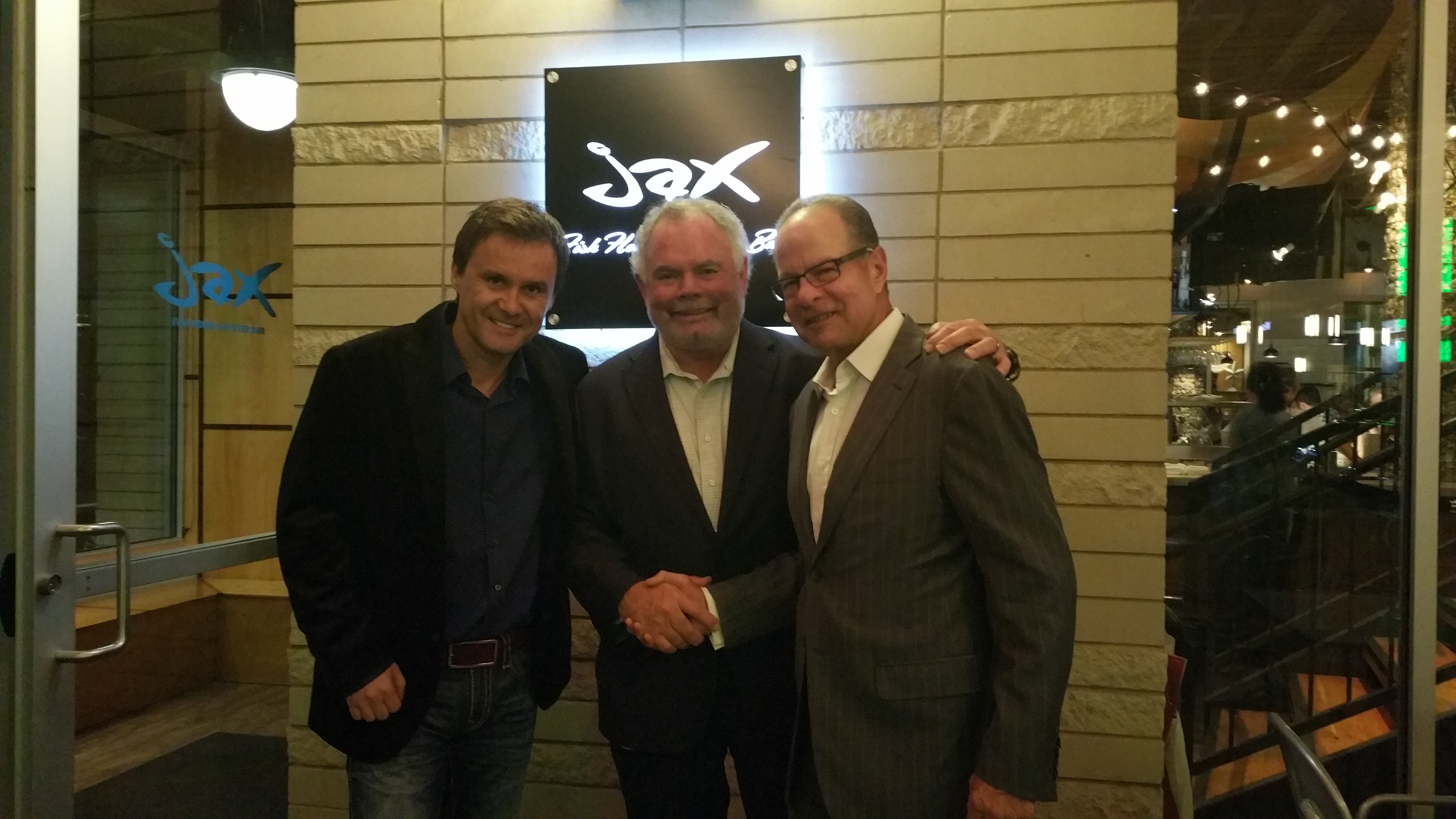
by Mark Smiley | Nov 2, 2015 | Main Articles
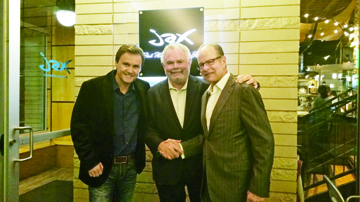 Acquires Key Office Building For 180 Project
Acquires Key Office Building For 180 Project
City Still In Tussle With Hotel REIT
by Charles C. Bonniwell
The City of Glendale has won key legal victories over MAK Investment Group LLC the investment vehicle of the wealthy Kholghy family from Iran that owns Authentic Persian and Oriental Rugs on Colorado Boulevard and 6.5 acres along the Cherry Creek corridor. City attorney Jeffrey Springer of the law firm Springer & Steinberg, P.C. has been leading the city’s litigation efforts in this matter. The Kholghys have been attempting to prevent Glendale from creating a $150 million eating and entertainment district along Cherry Creek titled Glendale 180, formerly known as the Glendale Riverwalk.
The Litigious Kholghys
The Kholghys filed two Rule 106 actions in Arapahoe County District Court asserting that they and not prominent Houston developer Wulf & Co. should have been chosen as the developer for the project. Considering that the rug merchants have no prior experience in real estate development, some legal experts indicated they found the pleadings somewhat of an embarrassment. District Court Judge Charles M. Pratt, in his order dismissing the lawsuit, stated that the Kholghys’ actions were nothing more than a complaint that the city awarded the contract to another bidder and they did not have a property interest in the award.
Judge Platt then dismissed a second complaint filed by the litigious Kholghys that said the hearing by the city authorizes the potential use of eminent domain by its urban renewal authority was deficient. The court held that the city fulfilled all statutory obligations.
The only remaining litigation between the Kholghys and the city is raised in claims in another Amended Complaint in which the Kholghys asserted that the city did not follow a different statute C.R.S. Sec. 31-25-105.5 (2) dealing with the transfer of private property acquired by eminent domain. The court indicated that if the allegations in this Amended Complaint were all found to be valid it might be a legally sufficient complaint, but adding that it was “not making findings of conclusions of law, but allowing the further development of the record and legal argument.” Legal experts indicate that since the Kholghys’ land was not in fact acquired by eminent domain it would be difficult to see how they could prevail on their claims under the applicable statute, but that will await another day in court.
Kholghy Candidates
In the meantime rumors have surfaced that the Kholghys have been trying to recruit an existing Glendale City Council member to run against Mayor Mike Dunafon in this spring’s municipal election, but have been r epeatedly turned down by everyone that has been asked.
epeatedly turned down by everyone that has been asked.
“Why would anyone want to be considered the Kholghys’ pawn for mayor or any other position in the city,” asked former Glendale Councilman R. Wayne King. “The Kholghys have disgraced themselves bringing hate groups like the paramilitary Promise Keepers and the Virginia-based Institute for Justice to threaten and intimidate Hispanic and African American families and kids. The Kholghys, to the best of my knowledge, have never given a single cent to a single charity or needy family in Glendale in the almost 25 years they have done business in the city. To be their pawn would be viewed by most of the citizens of Glendale that I talk to as the lowest of low. Good luck trying to be elected in this town being a Kholghy candidate this spring. Most people I know would throw you out of their apartment or home if you came knocking. We are a very diverse town and no one wants bigots elected to city council.”
Key Acquisition
In more good news for the prospects of Glendale 180 becoming a reality, the City of Glendale acquired a key parcel of land along Virginia Avenue on October 12, 2015. The parcel located at 4490 East Virginia is the home of Gamma Construction, a Houston, Texas-based general contractor who built a two-story office building in 1998 on the site for its Denver metropolitan operations.
Gamma Construction
Gamma bought the one square acre site under the name William Square Properties Inc. in 1997 for $310,000 and constructed the two-story office building the following year. The parcel once housed the highly popular Colorado Mine Company restaurant which operated in Glendale’s go-go days of the 1970s and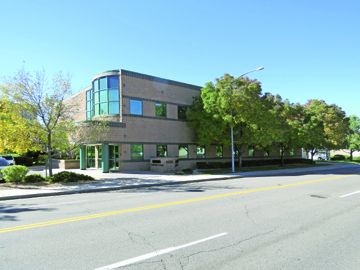 1980s. The restaurant was rock legend Elvis Presley’s favorite bar and restaurant when he visited the Denver area, and was a regular hangout for Denver Broncos and other Denver professional sports players.
1980s. The restaurant was rock legend Elvis Presley’s favorite bar and restaurant when he visited the Denver area, and was a regular hangout for Denver Broncos and other Denver professional sports players.
The city paid $2.6 million for the land and building and has agreed to allow Gamma Construction to occupy the site past closing as it builds another building in the Denver area for its operations. The city borrowed the money from Wells Fargo Bank but pledged $2.6 million in reserves thereby avoiding the expense of a Tabor election on the matter.
million for the land and building and has agreed to allow Gamma Construction to occupy the site past closing as it builds another building in the Denver area for its operations. The city borrowed the money from Wells Fargo Bank but pledged $2.6 million in reserves thereby avoiding the expense of a Tabor election on the matter.
“It is a key acquisition for the city,” stated Glendale Mayor Mike Dunafon, “and places us one step closer to our dream of an entertainment district along Cherry Creek from Colorado Boulevard to South Cherry.”
The owner and president of Gamma Construction, Keith Williams, flew in from Houston for the closing at Land Title Guarantee Company. Gamma is a quarter of a billion dollar annual revenue company that acts as a general contractor across the West and Midwest.
Williams was highly complimentary about Glendale and its personnel. “Mayor Mike Dunafon and city officials were always true to their word. They are the type of people we as a company like to work with. We have been in Glendale for 22 years and hate to leave, but I, and my company, want to wish the city and its residents all the best. I hope that the city is able to make the Glendale 180 Project a reality after all the great work they have done to make it possible.”
REIT Files Suit —–
Election Canceled
In a related matter Glendale and Summit Hospitality LLC, the owner of Staybridge Suites Hotel located at 4220 East Virginia Avenue, are at loggerheads concerning the city’s acquisition of that 3.7 acre site. Summit is a multibillion dollar real estate investment trust that is traded on the New York Stock Exchange. The city presented the owners of the site, Summit Hospitality, an independent appraisal showing the value of the land and building to be $15.8 million and suggested that, if they wanted, Summit should get its own appraisal. Summit indicated in a recent filing with the Securities and Exchange Commission they had differed several million dollars in needed improvements as they expected the property would become part of the Glendale 180 project.
But in lieu of getting an appraisal Summit hired aggressive litigator Tim Flanagan who quickly filed suit against the city claiming its Downtown Development Authority (“DDA”) election was invalid. The litigation made front page headlines in The Denver Post on October 6 under the heading “Glendale, hotel square off.” The vote was 10 to 3 as there were only 16 eligible electors including Summit, its liquor license holder. Three ballots were sent to registered voters staying at the hotel although none voted.
The City of Glendale and its urban renewal authority voted along with five individuals who acquired very small parcels as part of setting up the metro district three years ago. Flanagan asserted that the individual voters were a violation of the TABOR portion of the state constitution, asserting those voters were a “subterfuge of property ownership.”
However, The Denver Post quoted Ann Terry, executive director of the Special District Association, who noted that creating small landowners is a common mechanism in Colorado for metro districts to meet the ownership requirements of the state law.
Glendale has filed a motion to dismiss the suit indicating that it is frivolous and moreover Flanagan failed to file his suit in the proper timeframe under state law and asked the court to award the city attorney fees and costs.
Deputy City Manager Chuck Line stated that Summit owned 66% of the voting rights while only 23% of the land. With the acquisition of the Gamma Construction building the city now owns 77% of the land in the DDA. He also indicated Glendale created the formation of its metro exactly the same as Denver did in setting up a metro district regarding Union Station.
Nonetheless The Denver Post, a few days after its article, wrote an editorial castigating Glendale for having the five individuals participate in the DDA election.
The city canceled the Tabor election scheduled for November 3, which would have allowed the DDA to issue $200 million in bonds to help finance the Glendale 180 Project. The city’s project manager for the redevelopment, Mike Gross, hoped delaying the election would make negotiations with Summit easier and would allow Glendale to clean up outstanding litigation before moving forward.
Mayor Responds
Glendale Mayor Mike Dunafon indicated that the Summit REIT simply wanted to “put a gun to the head of the taxpayers,” and the lawsuit was little more than trying to get the city to overpay for the property. Summit had apparently previously indicated to the city that it was not spending several million in improvements in anticipation of the city acquiring the site.
Dunafon went on to note, “A major project is a great deal easier if you are simply buying a large vacant former farmland, but Glendale has no farm or vacant land as it is right in the middle of the Denver metropolitan area. When people find out that a city is doing a project they like to double or triple the property price, but a city has an obligation to pay a fair price but not rape the taxpayers. Urban projects always have a lot of challenges, but if you can get them done they are often enormous successes because of the demographics.”
Summit has repeatedly refused to return telephone calls from the press including The Denver Post, Westword and the Glendale Cherry Creek Chronicle.
Favorable Westword Article
Contrary to The Denver Post’s harsh editorial and more in line with John Aguilar’s front page story in The Denver Post, Westword’s Melanie Asmar wrote a seemingly balanced and generally favorable article on Glendale in its October 20 edition titled “Glendale Has Big Plans for the Future — And Just One Small Obstacle.” The article concluded by quoting Mayor Dunafon regarding the lawsuit by Summit and by implication of the lawsuits by the Kholghys — “It’s a shakedown.”
New Kholghy Demands
In the meantime, the litigious Kholghy family wrote another letter to the city September 15, 2015, demanding that the blight designation from their property be removed claiming it caused real estate developers not to be interested in their property.
Deputy City Manager Chuck Line replied back on September 15 noting the factors that caused the Kholghys’ property to be deemed blighted in 2004 and 2013 had not been remedied. He also expressed incredulity about the Kholghys’ claim that property in Glendale must be removed from the blighted designation before it could be redeveloped, noting numerous major properties designated blighted in Glendale that had been redeveloped, including but not limited to: CitySet, Cherry Creek Corporate Center, the Solara Apartment complex, King Soopers and Super Target.
He emphasized a landowner redevelops its property which causes the blighted designation to be removed, not the other way around. No reply to date has been received by the city from the Kholghys.
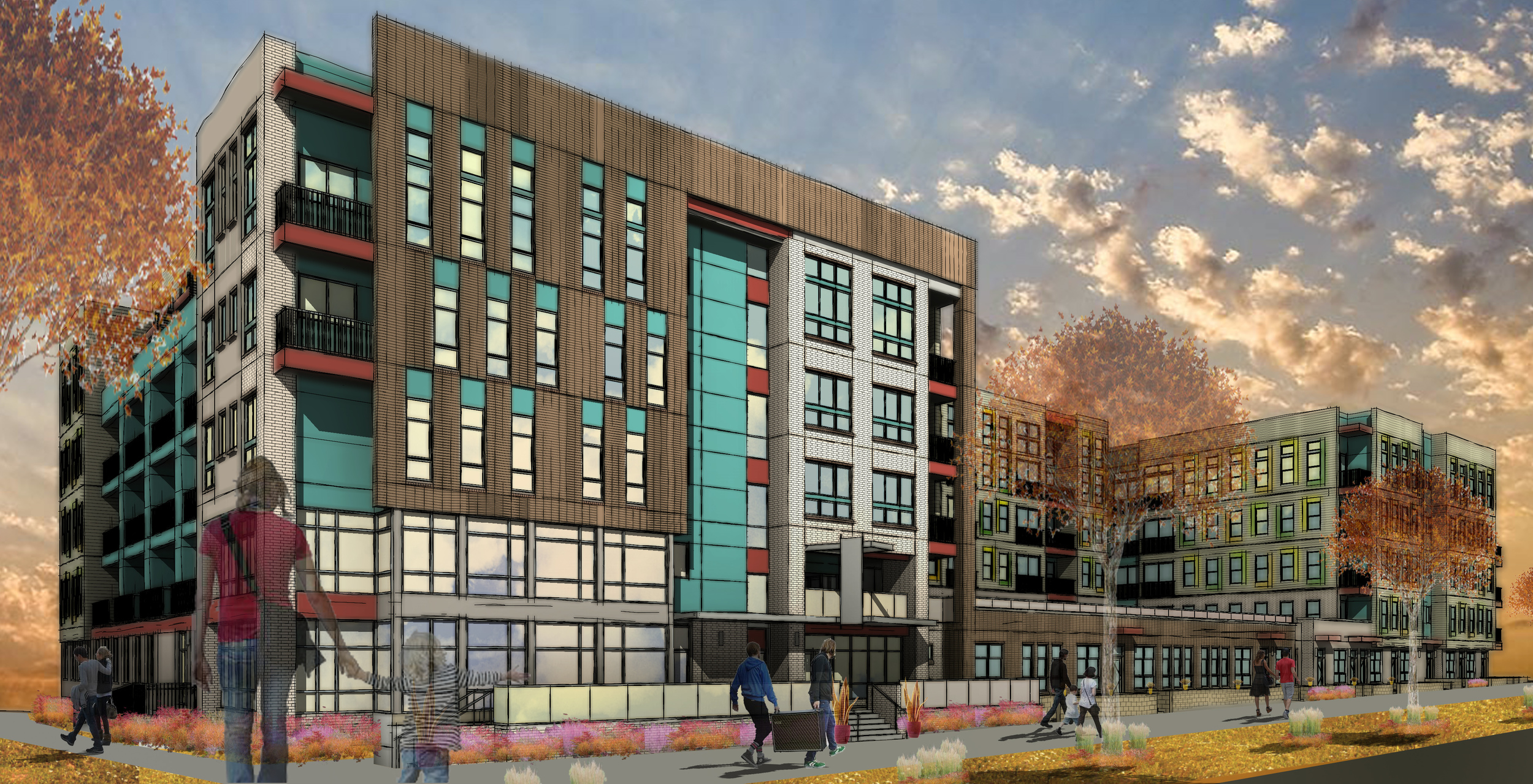
by Mark Smiley | Sep 25, 2015 | Main Articles
Slowing Metro Economy May Pull Rug From Under City’s Building Binge, Real Estate Firm Warns
by Glen Richardson
 Home sweet apartment home! To millennials and older lifestyle renters apartments are not only a place to hang their hat but the linchpin for Denver’s apartment building binge. As apartment projects currently under construction come onto the market, however, weakening in demand could be on the horizon by year-end warns Denver-based James Real Estate Services (JRES).
Home sweet apartment home! To millennials and older lifestyle renters apartments are not only a place to hang their hat but the linchpin for Denver’s apartment building binge. As apartment projects currently under construction come onto the market, however, weakening in demand could be on the horizon by year-end warns Denver-based James Real Estate Services (JRES).
In an average year there are approximately 4,000 to 5,000 new apartment units built in Denver, but in 2014 alone almost 10,000 units were built with another 20,000 units anticipated for 2015. An additional 20,000 units are in the planning stage for 2016. Thus over three years, over a decade’s worth of apartment houses may be built. Of course Denver is experiencing an influx of millennials because of its booming economy, but any slowdown may leave a glut in the apartment market.
In its latest quarterly analysis of the metro market known as the Apartment Perspective, Eric Karnes — JRES Director of Market Research — writes, “we see a strong possibility for deteriorating market conditions during 2015 and 2016.”
Skewed Numbers?
It is generally considered that if the apartment vacancy rate is below 5% it is an indication of an extremely healthy market for developers. But JRES raises doubts about the claims that the vacancy rate in Denver is actually under 5%. In reality Apartment Perspective says, “We believe that the metro Denver vacancy rate is more accurately in the 6-7% range rather than the estimated 4.9%.”
Stinging Analysis
In Denver the influx of younger residents or “millennials” benefits apartment demand, as does the rising demand for apartments by 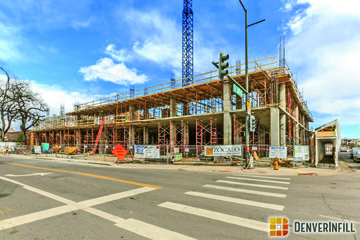 older “lifestyle renters” who no longer desire the responsibilities of property ownership. To some extent the number of college and university students also affects the market. In terms of younger renters, however, JRES says it is important to recognize that many are burdened by student loan debts and may not be making adequate salaries to justify renting some of the apartment units popular among developers.
older “lifestyle renters” who no longer desire the responsibilities of property ownership. To some extent the number of college and university students also affects the market. In terms of younger renters, however, JRES says it is important to recognize that many are burdened by student loan debts and may not be making adequate salaries to justify renting some of the apartment units popular among developers.
An article in The Wall Street Journal in May indicated that continued high rent in cities like Denver is a result of the type of apartments being built. The article points out: “ [I]n some places, including Denver, Tampa, Baltimore and Phoenix, virtually all new apartment construction has targeted to high-end renters.” As a practical mat-
ter that means the developers of the high-end apartment complexes may soon be in a bind. The higher rents are necessary to pay the loans taken out to build the units and a downturn in the economy may result in a significant amount of bank foreclosures similar to what happened in Denver when the office building boom crashed in the 1980s.
But studio apartments, also called “efficiencies” by some, are returning as a popular unit type, especially in new upper-rental rate apartment communities. Many of these projects are oriented to younger residents who are attracted to urban locations and amenities, but prefer to live alone and do not need large apartments. Smaller “micro” apartments are popular in expensive cities such as New York, San Francisco and Seattle and are coming to Denver. One such project is Turntable Studios, recently opened in a former hotel near Sports Authority Field. There will be apartments at Turntable under 350 square feet but will cost over $1,000 a month to rent.
Demand Is Key
Overall, since upcoming supply is known, it now all boils down to demand. JRES recommends that buyers, sellers and renters maintain a healthy skepticism and carefully track employment growth. Even if there is a downturn in the apartment market, however, it should not last more than several  years as long as the economy remains healthy and excessive development is avoided, JRES suggests.
years as long as the economy remains healthy and excessive development is avoided, JRES suggests.
James Real Estate Services, Inc. is a commercial real estate appraisal-advisory firm based in Cherry Creek. The firm offers a wide range of real estate appraisal services and products that help clients effectively analyze commercial and residential real estate assets and markets — as well as manage asset risk to realize asset value in a changing real estate marketplace. Information: 303-388-1100.
A Dozen Denver Apartments Open In 2015’s Second Quarter; Another In Glendale
A dozen new apartment complexes opened in Denver County during the second quarter of 2015 alone. Furthermore, Solana Cherry Creek — a new 341-unit development — just opened in nearby Glendale.
Apartments opening in Denver in recent months are:
Avenue 8 — Offering 163 units at 5805 East 8th Ave. by Rosemark Development Group in the Denver East.
Peregrine Place — A 65 unit complex by Catamount Properties at 4400 East Mississippi Ave. in Denver South.
Platt Park North — This is a 60-unit town home rental complex at 110 East Mississippi Ave. by Pando Holdings.
Steele Creek — The 12-story building at 3222 East 1st Ave. in Cherry Creek East is by BMC Investment.
Studio LoHi — Simpson Housing Group has opened this 114-unit complex at 2559 17th St.
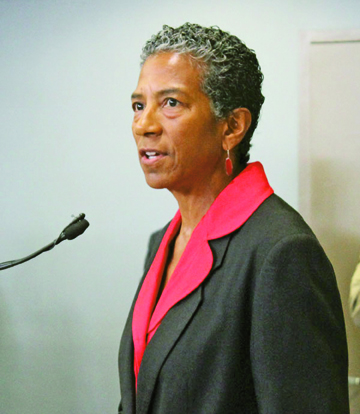
by Mark Smiley | Sep 25, 2015 | Main Articles
by Charles Bonniwell
 Mayor Michael Hancock’s appointment of CRL Associates lobbyist and former councilwoman Allegra “Happy” Haynes as newest executive director of the Denver Department of Parks and Recreation has been met with widespread criticism from across the Denver political spectrum.
Mayor Michael Hancock’s appointment of CRL Associates lobbyist and former councilwoman Allegra “Happy” Haynes as newest executive director of the Denver Department of Parks and Recreation has been met with widespread criticism from across the Denver political spectrum.
An expensive national search was undertaken by the city for the new parks executive director headed up by a 10 person search committee which included Haynes. Denver Mayor Michael Hancock brought the search to a sudden halt declaring that he was simply going to appoint his long-term political ally to the $139,500 position without further ado. He declared sua spointe to the surprise of the search committee that “she is going to make one dynamic, awesome director of the city parks and recreation.”
Others were less enthusiastic about her appointment. Park advocate Trish Abbott noted, “She comes in the great tradition of Wellington Webb’s first appointment to the position, Charles Roberts, who went to jail for stealing a grease trap from the parks department to put in an A&W he had an interest in over in Aurora. The appointment demonstrates how little this mayor cares what the citizens of the city think. I would like to think this is the lowest of the low but we have got many more years ahead of us with Mayor Hancock.”
Denver historian Phil Goodstein declared, “Hancock has clearly shown he has a thorough contempt for parks and quiet open space. On the contrary, Hancock demands parks become commercial ventures. Where possible, he has even been ready to sell them off.”
As for Haynes, Goodstein opined, “She has been part of the nefarious machine of CRL Associates, a lobbying firm which puts Brownstein Hyatt to shame in terms of directing city council and assuring the adoption of very bad policy . . . If anything, Haynes is the personification of old institutional Denver: smug self-centered, utterly linked to the Democrats, and having no conception that any alternatives are possible.”
Few individuals were willing to go on the record praising her appointment although City Councilman Albus Brooks, a political ally of Mayor Hancock and Haynes declared that Haynes is “a stateswoman of Denver” who is well equipped to deal with the “complexity and the politics” of the job.”
Upon assuming the job Haynes declared that the job was “an appointment of a lifetime” although at age 62 she is approaching the normal retirement age for Denver employees.
Haynes has quickly become mired in controversy as she does not wish to give up her position as president of the Board of Directors for Denver Public Schools. She is up for re-election this November.
Denver Attorney Joe Halpern indicated that “Happy Haynes was a prime mover in the destruction of the Hentzell Park Natural Area. She advocated for the land swap as a Denver Public Schools board member.”
Community activist Dave Felice was not pleased by the appointment and her desire to hold two positions noting, “How can we expect better from someone who was in favor of giving away 11.5 acres of Hampden Heights North (Hentzell) Park?”
While some individuals publicly raised the question of finding serious conflicts of interest in being both the executive director of Denver and president of the Denver School Board, Haynes does not. She said, “During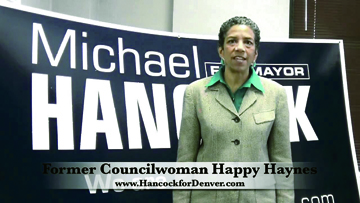 the day, I’ll devote my work time to my role in Parks and Recreation,” and her nights she would work on being the president of the School Board. She has requested an advisory opinion from the Denver Ethics Board. That Board has come under fire itself for failing to find conflicts of interest in various other cases involving members of the Hancock administration including Planning Board head Brad Buchanan and interim Parks head Scott Gilmore and his wife Councilwoman Stacy Gilmore.
the day, I’ll devote my work time to my role in Parks and Recreation,” and her nights she would work on being the president of the School Board. She has requested an advisory opinion from the Denver Ethics Board. That Board has come under fire itself for failing to find conflicts of interest in various other cases involving members of the Hancock administration including Planning Board head Brad Buchanan and interim Parks head Scott Gilmore and his wife Councilwoman Stacy Gilmore.
Trish Abbott noted, “I don’t see a problem. Ms. Haynes is best known for doing what she is told although with no small degree of utter incompetency. I am sure she can do two jobs very badly as easy as she can one. She is after all an all purpose political hack. In either position she is simply doing whatever the mayor or the people that control him want done, so I don’t see any conflict of interest. Moreover the Denver Ethics Board has indicated by and large that conflicts of interest don’t really exist as a theoretical concept in Denver government these days under Mayor Hancock no matter how blatant.”
Some citizens in Denver have indicated that they believe the entire Parks Department is under the control of lobbyists for real estate developers. When the Parks Advisory Board opposed Mayor Hancock’s giveaway of undesignated parkland in Hentzell Park he began to replace its members with real estate lobbyists like Marcus Pachner and Happy Haynes’ sister Khadija Haynes.
Regarding the appointment of Happy Haynes as executive director of Denver Parks, Joe Halpern stated, “She is the proverbial fox in the henhouse.”
Increasingly some good government advocates in Denver see the only solution to the destruction of the Denver Parks and Recreation Department is to advocate for voter approved Charter changes to limit the powers of the mayor. Joe Felice suggested, “Perhaps it is time for an elected independent park commission to take these decisions away from the mayor’s office.”
Trish Abbott and some other park advocates indicate that they concur with Felice’s concept. Whether they can make a vote a reality is an open question according to political insiders.

by Mark Smiley | Aug 31, 2015 | Main Articles
A Plea For A Bicycle-Friendly Denver
by Phil Kummer
 After a slow start to the biking season, due to very wet weather, bikers are being seen more and more in Denver and throughout the Metro area. As you ride around and talk with fellow bikers you can’t help but notice that bikers, bike routes and bike transport are treated as second-class, second-rate citizens in Denver and the surrounding area.
After a slow start to the biking season, due to very wet weather, bikers are being seen more and more in Denver and throughout the Metro area. As you ride around and talk with fellow bikers you can’t help but notice that bikers, bike routes and bike transport are treated as second-class, second-rate citizens in Denver and the surrounding area.
Recently radio personality Mike Rosen wrote a column for The Denver Post about the comments of Denver City Council members Mary Beth Susman and Albus Brooks who propose to discourage driving in Denver and make it more convenient for bikers. He states that “bicyclists are junior partners” when it comes to transportation in Denver. Most bikers, though, would say that bike transport is barely a partner and more like a “Johnny come lately” and not given its due in the transportation scheme of things.
Bicycles are the transportation stepchild that nobody wants to commit to yet but are necessary to acknowledge because there are, and will be, more issues with moving a lot of people through cities. Rosen’s point that the primary purpose of a road system is “to move a high volume of traffic and people quick ly and efficiently…” is partially correct. It fails though to consider issues such as car/bicycle crashes, freedom of mobility, parking, congestion, costs involved in maintaining a street for an automobile vs. a bicycle, air pollution, pedestrian safety, safety in general and neighborhoods.
ly and efficiently…” is partially correct. It fails though to consider issues such as car/bicycle crashes, freedom of mobility, parking, congestion, costs involved in maintaining a street for an automobile vs. a bicycle, air pollution, pedestrian safety, safety in general and neighborhoods.
As far as being efficient, it seems odd that one would consider commuting by a vehicle with generally one occupant, the driver, and having 25 percent occupancy as being efficient. Rosen’s article is a celebration of mindlessness and dogma that has 20/20 vision concerning what has worked for the past 60 years but has nothing to offer that might address the above issues.
The perception that bike transport is an unwanted stepchild is reinforced by the recent auditor’s report that shows a serious underfunding of the Denver Moves plan. Denver Moves is a citywide plan approved in 2011 that “expands the vision for the non-motorized transportation and recreation system in Denver.” Denver Bikes and the Mayor’s Bicycle Advisory Committee are both doing yeoman’s work as far as promoting and overseeing the construction of bike friendly infrastructure as specified by Denver Moves, yet it seems an uphill battle.
The plan “focuses on integrating the existing off-street and on-street networks to create safe, comfortable corridors that link neighborhoods, parks, employment centers, business districts, transit hubs … in all parts of Denver.” Unfortunately, since 2013, the city has dedicated only $2.8 million for bike lanes and pedestrian-oriented projects from the capital improvements budget, a tiny fraction of the estimated overall cost of $119 million.
Although budget concerns are important, the bigger picture concerning bike transport is how to retrofit an entire city to produce a safe, convenient, efficient and effective way to travel that will be used by the multitudes. Denver, as most cities, is trying to fit a bike system into a preexisting system designed for cars, trucks and motorcycles so no matter how much sense it makes to promote bikes and other alternative modes of transportation it will always be difficult to retrofit a 60-year-old system to meet new and different transport goals.
Even though Vincent Carroll in a recent Denver Post column, sees this effort by the city as “a methodical, long-term effort to frustrate the use of the personal auto,” it is actually an effort to counteract the years  of neglect and disrespect that bike transport has suffered by a society that is in love with motor vehicles. Our government, Federal, State and local, has long supported low density housing and the transport systems designed for that lifestyle. In the marketplace of transport alternatives we’ve been given one realistic choice — get a car and be happy.
of neglect and disrespect that bike transport has suffered by a society that is in love with motor vehicles. Our government, Federal, State and local, has long supported low density housing and the transport systems designed for that lifestyle. In the marketplace of transport alternatives we’ve been given one realistic choice — get a car and be happy.
In planning to retrofit a bike system the biggest factor is safety and how comfortable riders feel on the road or bikeway. In 2013, Michael Andersen of People for Bikes in his article “Selling Biking: Perceived Safety, The Barrier That Still Matters,” cited studies and surveys in Portland and San Francisco that indicate the vast majority of cyclists are concerned for their safety while on the road, and they especially feared a collision with an auto. On a national level 743 cyclists were killed and about 48,000 were injured in motor vehicle traffic crashes in 2013. The average age for those killed is 44 and of those injured the average is 32 so it would seem that is not a young and reckless group. Colorado suffered 12 biker fatalities in 2013.
Bike to Work Day, an event promoted by Bike Denver and the Mayor’s Bike Advisory Committee, was held June 24 and drew approximately 32,800 bikers who rode an average of 9.2 miles one way to work. On a daily basis Denver has generally fewer than 7,000 bike commuters or about 2 percent of the total number of commuters. Although this is a small number, it is actually very significant given the difficulties and dangers that bikers have to put up with while riding on Denver streets.
This suggests that if Denver streets were actually biker friendly we could reduce the number of vehicles and congestion, make parking easier and spend less money on road maintenance. But the bigger question for the biking community is, “how do we make biking a general form of transportation and not just for a small number of hard core bikers?” Mobility freedom then should be promoted for all Denver citizens not just those who have a motor vehicle or who brave the mean streets on a bike.
An interesting solution to mobility freedom was highlighted in the April 2015 Glendale Cherry Creek Chronicle in a front page article by Heather Brecl, “The Sunny Side to An Eco-Friendly Revolution: the ELF.” The article describes a new, high tech vehicle that is powered by both the rider with pedals and a solar powered motor. Neither Bike Denver nor the Mayor’s Bicycle Advisory Committee have addressed new technologies such as three- or four-wheeled bicycles that are part human powered and part motor driven. The ELF, which is 9 feet long, over 4 feet wide and 5 feet tall, is larger than your standard two-wheeled bike. It is attractive as a commuter vehicle but there does not seem to be a place for it on Denver streets. This type of vehicle, which is technically a bike, has the potential to be a transportation game changer but will there be a place where the multitudes can use a vehicle such as this?
One solution that has yet to be discussed is to have bike only streets that welcome a variety of human powered or combo-powered bikes. A few strategic, long streets in Denver could be selected that would lend themselves to a different type of commuting and biking experience. Only then, will we as a city be able to say that we did our best to solve the transportation and parking issues that dog us every day.

by Mark Smiley | Aug 31, 2015 | Main Articles
Part II Of City’s Attack On Its Own Neighborhoods?
by Glen Richardson
 Denver has been known for its highly livable neighborhoods which contain more single family homes than almost any comparable city in the United States. But single family homes have been deemed by some progressive urbanists as a villain in the fight against urban sprawl and the cause of much hated suburbia.
Denver has been known for its highly livable neighborhoods which contain more single family homes than almost any comparable city in the United States. But single family homes have been deemed by some progressive urbanists as a villain in the fight against urban sprawl and the cause of much hated suburbia.
There has been a call for ever more density in Denver by individuals such as Denver Planning Executive Director Brad Buchanan (who lives on a 1,500 acre ranch outside of Denver) and former councilman and failed auditor candidate Chris Nevitt. Nevitt demanded in a speech explaining why he was voting for high density rezoning of Mount Gilead Church property that every neighborhood in Denver must do its share to absorb high density. His views were condemned by neighborhood groups and even by The Denver Post in a scathing editorial. But his views are believed to be supported by a significant majority on the Denver City Council.
 But building high-rise apartments on former park and church land has been deemed by Nevitt and others as not sufficient to destroy the single family neighborhood character of neighborhoods like Washington Park, Hilltop, Crestmoor, Congress Park and Cherry Creek North. Thus some members of the Denver City Council have turned to doing away with concept of “single family” homes at all. By pushing the idea of “short-term rentals” where every former single family home can be turned into a mini apartment house, high density can also be obtained.
But building high-rise apartments on former park and church land has been deemed by Nevitt and others as not sufficient to destroy the single family neighborhood character of neighborhoods like Washington Park, Hilltop, Crestmoor, Congress Park and Cherry Creek North. Thus some members of the Denver City Council have turned to doing away with concept of “single family” homes at all. By pushing the idea of “short-term rentals” where every former single family home can be turned into a mini apartment house, high density can also be obtained.
What were once sleepy streets throughout the city are suddenly waking up to the fact that the Valley’s homes-as-lodging trend is growing fast albeit not without controversy.
Neighborhood advocates say the trend is creating parking, trash and noise issues plus in a few instances disruptive or illegal activities. Furthermore, they argue these rentals detract from the peaceful and quiet enjoyment of neighborhood homes and property.
Despite currently being illegal (City’s Zoning Code requires month-to-month or longer tenancy), Denver’s short-term rental market is among the hottest in the nation. Airbnb alone has 1,000 Denver properties listed, according to Denver City Councilwoman Mary Beth Susman, the Council’s task-force chair. In fact Zillow — the online real estate database company — ranks Denver fifth among the country’s 50 top markets. Zillow also puts Denver as the eighth most expensive rental market in the U.S. and the most expensive between the two coasts.
Tech, Money Driven
Technology startups have emerged to encourage home rentals and host short-term retail platforms such as Airbnb, VRB O, HomeAway and others. These new and suddenly proliferating hospitality services are helping propel local property owners into the home rental business by providing hotel-type services from simple key exchanges to full rental management. A startup — known as the Key Exchange — gives homeowners the opportunity to store their property keys at a neighborhood restaurant and be notified when they are picked up or dropped off by renters.
O, HomeAway and others. These new and suddenly proliferating hospitality services are helping propel local property owners into the home rental business by providing hotel-type services from simple key exchanges to full rental management. A startup — known as the Key Exchange — gives homeowners the opportunity to store their property keys at a neighborhood restaurant and be notified when they are picked up or dropped off by renters.
Pillow — a full-service online short-term rental service — handles listings and price optimization, bookings, guest screening and communications, key exchange plus laundry. Currently, it works with Airbnb, VRBO and HomeAway. Pillow recently raised $2.65 million and is planning to expand its full service into 10 U.S. cities.
A key reason short-term rentals are becoming common is because these renters are paying top dollar. Furthermore, more money can often be made by renting homes to tourists for a few days at a time compared to renting to local families on a monthly or yearly basis. Additionally, a new type of property buyer is entering the local housing market exploiting the sudden popularity of short-term rentals with an eye on quick profits. A Florida firm, for example, recently purchased a Capitol Hill building and is renting all of the units on a short-term basis, upsetting local residents. Finally, a growing number of tourists are seeking vacation destinations that offer something more than simply a hotel room.
Grappling Wit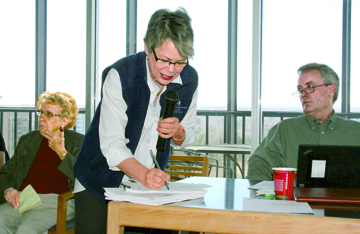 h Issues
h Issues
Issues regarding short-term rentals are coming to a head in Valley neighborhoods plus the Denver City Council is looking at length at the issues. What they are finding out is that there are a lot of problems. Recognizing that vacation rentals are not a passing trend, nearly every Valley neighborhood is grappling with regulations to help mitigate their impact.
Neighborhood organization INC — the Inter-Neighborhood Cooperation — has passed a resolution urging both the Denver City Council and Mayor Michael Hancock to enforce the provisions of the Denver Zoning Code prohibiting short-term rentals. The organization is also calling for a range of regulations that would include taxation, licensing and limitations based on density and location.
When the City Council’s Shared Economy Task Force began studying short-term rentals, resident George Mayl asked, “Why on such an important citywide topic have the meetings by Councilwoman Susman not been televised?” This April her Task Force became part of the Council’s Neighborhood & Planning Committee and is now televised on the fourth Wednesday of each month. Mayl told the Chronicle, “It is time for the City to protect its residential neighborhoods from commercial encroachment.” He observes that more and more cease and desist orders are being brought to Board of Adjustment hearings as residents learn they do not have to put up with motel type activities in their neighborhoods.
Close To Home
Short-term rentals drew special interest from attendees at the West Wash Park Neighborhood Assn. (WWPNA) meeting on April 22. The attention was due to the fact a neighborhood home owned by a Florida investor was listing the home for rent as cannabis-friendly. The owner withdrew her appeal of a cease and desist order after her properties in Congress Park were closed down.
“The members at this meeting were quite concerned that these short-term rentals can be disruptive, the lodging taxes aren’t paid, they remove housing — particularly affordable housing — from an already squeezed market and violate the zoning code and commercialize residential zoning,” resident Charlotte Winzenburg tells the Chronicle.
She adds that when the Denver Zoning Code was being re-written, “WWPNA was an active participant in all the public meetings and had an ad hoc committee that spent many hours over many months studying the proposed code, commenting on proposals and lobbying for the zoning that our neighbors told us they wanted.”
Neighborhood Risks
The INC Zoning & Planning Committee known as ZAP has analyzed the potential impact to Denver’s neighborhoods and identified significant risks. “Our assessment includes the effect it will have on affordable housing, key enforcement agencies and Denver governmental departments. The Committee has grave concerns about the real possibilities of unforeseen and unintended consequences of permitting short-term rentals in residential neighborhoods. This is not a problem for another day. The decisions we make today will determine the future of Denver’s neighborhoods,” says the ZAP Committee co-chaired by Margie Valdez and Greg Kerwin.
Among the issues Denver City Council must address is the argument by proponents that private property rights must be protected. Advocates also contend regulations could harm the economy. Furthermore, if regulations are adopted, how many short-term rentals should be allowed in a neighborhood and how would the number be determined? Should registration and/or licensing be required in order to provide notice to neighborhoods (needs and desires hearings)?
The City must also consider what new City Ordinances should be required for short-term rentals. Possibilities include public nuisance, noise limits, property maintenance standards and nighttime curfews. Other considerations include parking restrictions, inspections, and emergency access. Finally, will new trespassing and disturbing the peace regulations be necessary?
What’s At Stake?
INC estimates that any change to regulations that would allow short-term rentals could result in 10,000 or even 20,000 or more added neighborhood rentals to Denver. “How many of these will be in violation of what change might be made to the zoning code?” the organization asks. Another question: “How will Denver’s Neighborhood Inspection Services possibly be able to monitor a greater number than they currently cannot monitor, particularly when other cities have been unable to do so?”
Lenders and insurers of properties must be included as stakeholders to ensure loan and insurance documents are in compliance, INC believes. Homeowners insurance, they note, does not include short-term rental damages. They also worry that a lack of premise health and safety inspection would endanger visitors and tourists.
Turning neighborhoods into areas for motels and hotels destroys the integrity of the neighborhood and, more importantly, the expectations of the property owners who purchased the property with the intention of a neighborhood remaining a residential neighborhood, INC says. Wrapping up, the citywide advocate representing Denver neighborhood association members concludes: “This is a city we call home. Is City Council propounding legislation that benefits a few residents and shared economy entrepreneurs-opportunists at the expense to the quality of life of most Denver residents? We hope not.”

 There has never been a department store opening in Denver quite like that RH Denver (f/n/a Restoration Hardware) had on the evening October 15. Getting an invitation to the event was the hottest ticket in town and the elaborate and costly invitation itself made it clear that the “invitation was nontransferable.” There were doormen and others outside who made sure that no gatecrashers were permitted into the festivities.
There has never been a department store opening in Denver quite like that RH Denver (f/n/a Restoration Hardware) had on the evening October 15. Getting an invitation to the event was the hottest ticket in town and the elaborate and costly invitation itself made it clear that the “invitation was nontransferable.” There were doormen and others outside who made sure that no gatecrashers were permitted into the festivities. firm Brownstein Hyatt Farber Schreck.
firm Brownstein Hyatt Farber Schreck. t in the not too distant future. RH hired good looking models as greeters. Also attending the event were wealthy, single (or soon to be single) businessmen who were escorted by highly attractive females half their age who were sometimes introduced as “nieces” or “friends of their daughters.”
t in the not too distant future. RH hired good looking models as greeters. Also attending the event were wealthy, single (or soon to be single) businessmen who were escorted by highly attractive females half their age who were sometimes introduced as “nieces” or “friends of their daughters.” Hardware Holdings Inc. based in Corte Madera, California, which is traded on the New York Stock Exchange under the symbol RH. RH Denver is the company’s 7th full line design gallery and it also has 59 smaller galleries as well as 18 outlet stores in the United States and Canada, including one in the Outlets at Castle Rock.
Hardware Holdings Inc. based in Corte Madera, California, which is traded on the New York Stock Exchange under the symbol RH. RH Denver is the company’s 7th full line design gallery and it also has 59 smaller galleries as well as 18 outlet stores in the United States and Canada, including one in the Outlets at Castle Rock.



















